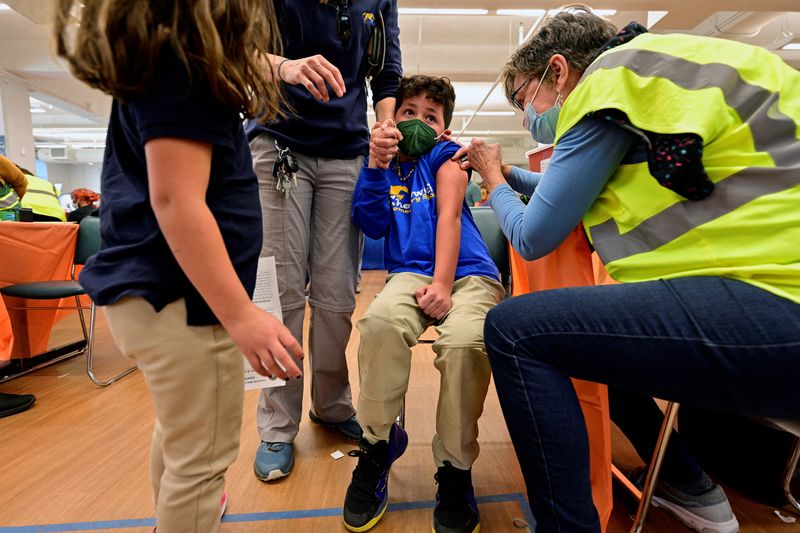(This May 31 story, corrects the interval between second and third Pfizer shot in paragraph 5 to two months not three months)
By Manas Mishra
(Reuters) - Advisers to the U.S. Food and Drug Administration are due to meet in June to decide on whether to recommend authorizing Moderna (NASDAQ:MRNA) Inc's vaccine for children below 6 years old, and Pfizer Inc (NYSE:PFE) and BioNTech SE (NASDAQ:BNTX)'s COVID-19 vaccine for children below 5 years old.
Here is a look at some of the factors expected to be considered in this decision concerning the last age groups not yet covered by previous U.S. regulatory authorizations for COVID-19 vaccines.
HOW MANY DOSES ARE NEEDED?
Moderna has filed with the FDA seeking authorization for a two-dose regimen of its vaccine, called Spikevax, in children ages 6 months to 6 years old. Pfizer has not yet completed its FDA authorization application but its clinical trial tested a three-dose course of the vaccine for children ages 6 months to under 5 years old.
Moderna plans to use a 25 micrograms dose in that age group, lower than the 100 micrograms used in the first two doses in adults and the 50 micrograms used as a booster dose for non-immunocompromised adults. In its clinical trial, Moderna administered the two doses 28 days apart.
Pfizer and BioNTech's vaccine, called Comirnaty, was tested as a 3 microgram formulation in children below 5 years old, versus the 10 microgram version used in children ages 5-11 and a 30 microgram dose used for people ages 12 and older. In their clinical trial, children were given the first two doses around three weeks apart, with the third dose administered at least two months after the second.
Lower-dose versions are expected to reduce any side effects associated with the vaccines.
HOW EFFECTIVE ARE THE VACCINES?
For the Moderna vaccine in a clinical trial involving roughly 6,700 children, efficacy in preventing symptomatic infections among children 6 months to 2 years old was 43.7%, while efficacy was 37.5% for children 2-6 years old.
There have not yet been enough symptomatic cases of COVID-19 among the children in the Pfizer-BioNTech trial to produce a final efficacy figure. An early analysis based on 10 symptomatic COVID-19 cases identified when the Omicron coronavirus variant was dominant suggested a vaccine efficacy of 80.3% in the under-5 age group. Pfizer and BioNTech plan to update those figures after at least 21 children in the trial get symptomatic COVID-19.
ARE THE VACCINES SAFE FOR CHILDREN?
Safety data that included 1,678 children in Pfizer's trial showed that side effects were generally comparable to those observed in adults. Pfizer said it chose the lower-dose 3-microgram version because of its safety profile. While it did not disclose specific safety data, it said the vaccine at this dosage was generally as safe as the placebo used in the study.
Moderna's data showed that any side effects were mostly mild and moderate, with fever temperature similar to that experienced after vaccination with other pediatric vaccines. Fever greater than 104 degrees Fahrenheit was observed in 0.2% of children ages 2-6 years and those ages 2 months to 2 years.
Moderna said there were no reports of myocarditis or pericarditis, types of heart inflammation that have been linked to mRNA vaccines in rare cases among young men, in its trial.
The U.S. Centers for Diseases Control and Prevention has said, based on data from the Pfizer vaccine, that rates of heart inflammation have been much lower in boys 5-11 years old than in adolescents and young men.
WHY VACCINATE YOUNG CHILDREN?
If the shots win regulatory authorization in these age groups, parents will have to decide whether to get their children vaccinated. One question they might have is whether it is worth it, considering that many young children were infected during the Omicron wave. Experts have said natural immunity wanes over time. Data has shown that in older children and adults that those who had an infection and received a booster shot had the most protection against COVID-19, according to Dr. Matthew Harris, a pediatric emergency medicine physician at Northwell Health in New York.

Vaccines also protect against hospitalizations and deaths, said Harris, calling these important reasons why parents should consider vaccinating their children.
The FDA has set June 15 as the date to review authorizing the Moderna and Pfizer/BioNTech vaccines for these age groups.